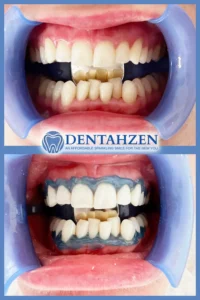The Surprising Truth: Effects of Teeth Whitening on Tooth Enamel in 2023
Enamel, the outermost layer of the tooth, plays a vital role in protecting the underlying dentin and nerves. It is the hardest substance in the human body and provides strength and durability to our teeth. Research suggests that certain teeth whitening techniques, particularly those that involve bleaching agents, may have unintended consequences on enamel health. Studies have shown that these agents can penetrate the enamel and cause structural changes, such as thinning and increased permeability. While the effects may vary depending on the individual and the specific procedure used, it is clear that teeth whitening can have an impact on enamel health that should not be ignored.
As the demand for teeth whitening continues to grow, it is crucial for individuals to prioritize their enamel health and seek professional guidance when considering these procedures. Dental professionals can provide personalized recommendations based on an individual’s oral health condition and help determine the most suitable teeth whitening options. Additionally, maintaining good oral hygiene practices, such as regular brushing and flossing, can help protect the enamel and minimize potential damage. By understanding the potential risks and taking the necessary precautions, individuals can enjoy a dazzling smile without compromising their enamel health.
The impact of teeth whitening on dental enamel
The process of teeth whitening has gained popularity due to its ability to enhance smiles and boost confidence. However, it is important to understand the potential impact that teeth whitening can have on dental enamel. Dental enamel, the protective outer layer of our teeth, is strong but can be susceptible to damage from teeth whitening procedures.
Research has shown that teeth whitening products, particularly those containing hydrogen peroxide or carbamide peroxide, can potentially cause dental enamel damage. These bleaching agents work by penetrating the enamel and breaking down the molecules responsible for tooth discoloration. However, in the process, they can also weaken the enamel, making it more vulnerable to abrasion and erosion. Therefore, it is crucial to approach teeth whitening treatments with caution and under proper professional guidance to minimize the risk of dental enamel damage.
Understanding the long-term effects of tooth whitening on enamel health
Tooth whitening is a popular cosmetic procedure that aims to brighten the teeth and enhance one’s smile. However, it is crucial to understand the possible long-term effects of teeth whitening on enamel health. Enamel, being the protective outer layer of the teeth, plays a vital role in safeguarding against dental decay and sensitivity. Therefore, it is imperative to thoroughly investigate the impact of tooth whitening on enamel in the long run.
Several studies have been conducted to assess the long-term effects of tooth whitening on enamel health. Research suggests that while tooth whitening can effectively lighten the shade of teeth, it may also have some adverse effects on enamel. Over time, the repeated exposure of teeth to whitening agents can weaken and thin the enamel layer, making the teeth more prone to damage and sensitivity. Understanding the long-term effects of tooth whitening on enamel health is crucial in order to strike a balance between achieving a brighter smile and maintaining optimal oral health.
Enamel erosion: a potential consequence of teeth bleaching
Teeth bleaching, a popular cosmetic dental procedure for achieving a brighter smile, has gained immense popularity in recent years. However, it is essential to understand that enamel erosion due to teeth bleaching can be a potential consequence of this treatment. Enamel erosion refers to the gradual loss of the outer protective layer of teeth, leaving them vulnerable to sensitivity and damage.
The harsh chemicals used in teeth bleaching products can cause enamel erosion, particularly if the procedure is not performed correctly or is done too frequently. When the enamel becomes eroded, it weakens the tooth structure, making it more prone to tooth decay, cracks, and sensitivity. While teeth bleaching can provide immediate aesthetic benefits, it is crucial to consider the potential risks and take measures to protect the enamel during and after the treatment.
Promoting tooth remineralization after teeth whitening
Tooth remineralization post teeth whitening is an essential aspect to consider for maintaining the long-term health of the enamel. Teeth whitening procedures, while effective in removing stains and discoloration, can potentially weaken the enamel and make it more susceptible to damage. Therefore, promoting tooth remineralization after teeth whitening becomes crucial to restore the strength and integrity of the enamel.
One way to promote tooth remineralization post teeth whitening is through the use of remineralizing agents or products. These products typically contain minerals such as calcium and phosphate, which are essential building blocks for enamel structure. Applying these agents after teeth whitening treatments can help replenish the minerals lost during the process and support the natural remineralization process of the enamel. By providing the necessary minerals, these agents aid in repairing any microdamage that may have occurred during teeth whitening and help restore the enamel’s strength and resilience.
The occurrence of enamel microabrasions due to teeth whitening
Enamel microabrasions caused by teeth whitening are a potential concern for individuals seeking a brighter smile. These tiny, superficial grooves on the tooth surface can occur as a result of the whitening process. While teeth whitening is generally considered safe, it is important to be aware of the possibility of enamel microabrasions and understand their implications.
The occurrence of enamel microabrasions due to teeth whitening can be attributed to factors such as the abrasive nature of some whitening products and improper application techniques. Certain whitening treatments, especially those using hydrogen peroxide or carbamide peroxide, can cause a mild etching effect on the enamel, leading to the formation of microabrasions. Additionally, excessive pressure or prolonged exposure to the whitening agent can exacerbate the risk. It is crucial for individuals to follow the instructions provided by dental professionals and use products recommended by reputable sources to minimize the likelihood of enamel microabrasions.

Examining the correlation between tooth color changes and enamel health
Tooth color changes can be a common concern for individuals seeking teeth whitening treatments. While the desire for a brighter smile is understandable, it is crucial to consider the potential impact of these procedures on enamel health. Enamel, as the protective layer of our teeth, plays a vital role in maintaining their strength and integrity. However, research examining the correlation between tooth color changes and enamel health suggests that certain whitening methods may have adverse effects on enamel.
When teeth undergo the whitening process, it is essential to be aware that enamel health can be jeopardized. Some teeth whitening techniques involve the use of harsh chemicals or abrasive agents that may lead to enamel erosion or microabrasions. These changes in enamel structure can weaken the teeth over time and potentially lead to dental issues, such as tooth sensitivity or decay. Therefore, individuals considering teeth whitening should carefully weigh the aesthetic benefits against potential risks to enamel health.
Assessing enamel strength following teeth whitening treatment
Enamel strength after teeth whitening treatment is a crucial factor in determining the overall health of one’s teeth. As individuals strive for a brighter and more dazzling smile, it is important to consider the potential impact on the strength of the enamel. Research studies have delved into this area to shed light on the effects of teeth whitening treatment on enamel strength.
One study conducted by dental researchers examined the changes in enamel strength following teeth whitening treatment. The findings revealed that while certain teeth whitening agents may cause a temporary reduction in enamel strength, this effect is typically short-lived. It was observed that enamel strength tends to return to normal levels within a few weeks after the treatment. Understanding these dynamics can help dental professionals provide the necessary guidance to individuals seeking teeth whitening while also ensuring the maintenance of enamel strength.
The risk of enamel demineralization from teeth whitening procedures
Enamel demineralization from teeth whitening procedures is a concern that has garnered attention in recent years. When undergoing teeth whitening, the bleaching agents used can have an impact on the mineral content of the enamel. Studies indicate that certain types of teeth whitening treatments, particularly those with higher concentrations of bleaching agents, can potentially cause a temporary decrease in enamel mineral density, leading to demineralization.
The process of enamel demineralization occurs when the minerals that make up the enamel, such as calcium and phosphate, are dissolved and leached out from the teeth. This can weaken the structure of the enamel and make it more prone to sensitivity and damage. Enamel demineralization from teeth whitening procedures has been observed to be more common in individuals who have pre-existing enamel erosion or thin enamel layers. Therefore, it is crucial for dental professionals to evaluate the condition of the patient’s enamel prior to recommending any teeth whitening treatment, and to consider using lower concentrations of bleaching agents to minimize the risk of demineralization.
The importance of enamel protection during teeth whitening
Tooth whitening has become increasingly popular in recent years as more people strive for a bright, white smile. However, it is important to recognize the potential risks and take appropriate measures to protect the enamel during the teeth whitening process.
Enamel protection during teeth whitening is crucial to maintain optimal oral health. The outer layer of the tooth, enamel, serves as a protective shield, guarding against tooth sensitivity and decay. Without proper protection, the harsh chemicals used in teeth whitening products can strip away this protective layer, leading to enamel erosion and weakened teeth. Therefore, it is imperative to prioritize enamel protection when embarking on a teeth whitening journey to preserve the integrity of the teeth.
By taking proactive steps to safeguard the enamel, individuals can achieve a whiter smile without compromising their oral health. Dental professionals can offer guidance on choosing the right teeth whitening method and provide personalized instructions on how to protect the enamel during the process. With enamel protection at the forefront, individuals can enjoy the benefits of teeth whitening while maintaining strong and healthy teeth.
Frequently Asked Questions
What is tooth sensitivity and how is it connected to teeth whitening?
Tooth sensitivity refers to the temporary discomfort or pain experienced in teeth when exposed to certain stimuli such as hot or cold temperatures. Teeth whitening can cause tooth sensitivity as the bleaching agents used in the process can penetrate the enamel and irritate the nerves inside the teeth.
How does teeth whitening impact dental enamel?
Teeth whitening procedures involve the use of chemicals that can penetrate the enamel and break down stains. While this helps in whitening the teeth, it can also weaken the enamel if not done properly or if overused.
What are the long-term effects of tooth whitening on enamel health?
The long-term effects of tooth whitening on enamel health depend on various factors such as the frequency of whitening treatments and the individual’s oral hygiene practices. Overuse or improper use of teeth whitening products can lead to enamel erosion and increased sensitivity.
Can teeth bleaching cause enamel erosion?
Yes, teeth bleaching can potentially cause enamel erosion if not done correctly or if used excessively. The bleaching agents can weaken the enamel, making it more susceptible to erosion and damage.
How can tooth remineralization be promoted after teeth whitening?
To promote tooth remineralization after teeth whitening, it is important to maintain good oral hygiene practices. This includes regular brushing, flossing, and using fluoride toothpaste or mouthwash. Additionally, using enamel-strengthening toothpaste or remineralizing gels can also help.
Are enamel microabrasions a potential consequence of teeth whitening?
Yes, teeth whitening procedures can potentially cause enamel microabrasions, which are tiny surface scratches on the enamel. These microabrasions can make the teeth more susceptible to staining and can also contribute to tooth sensitivity.
Is there a correlation between tooth color changes and enamel health?
Yes, there is a correlation between tooth color changes and enamel health. Teeth that have undergone teeth whitening procedures and have become significantly whiter may indicate that the enamel has been compromised to some extent.
How can enamel strength be assessed following teeth whitening treatment?
Enamel strength following teeth whitening treatment can be assessed through dental evaluations and regular check-ups with a dentist. Dentists can assess the enamel’s hardness, thickness, and overall health to determine any potential weakening or damage.
Is there a risk of enamel demineralization from teeth whitening procedures?
Yes, there is a risk of enamel demineralization from teeth whitening procedures, especially if done incorrectly or excessively. Demineralization occurs when the minerals that make up the enamel are lost, leading to weakened and more susceptible teeth.
Why is enamel protection important during teeth whitening?
Enamel protection during teeth whitening is crucial because the enamel acts as a protective layer for the teeth. Weakening or damaging the enamel can lead to various oral health problems such as tooth sensitivity, enamel erosion, and enamel demineralization.

